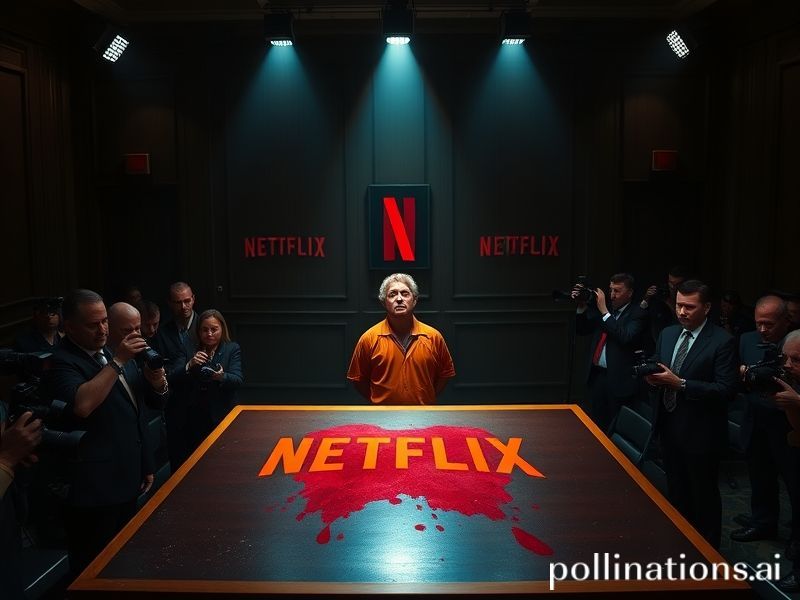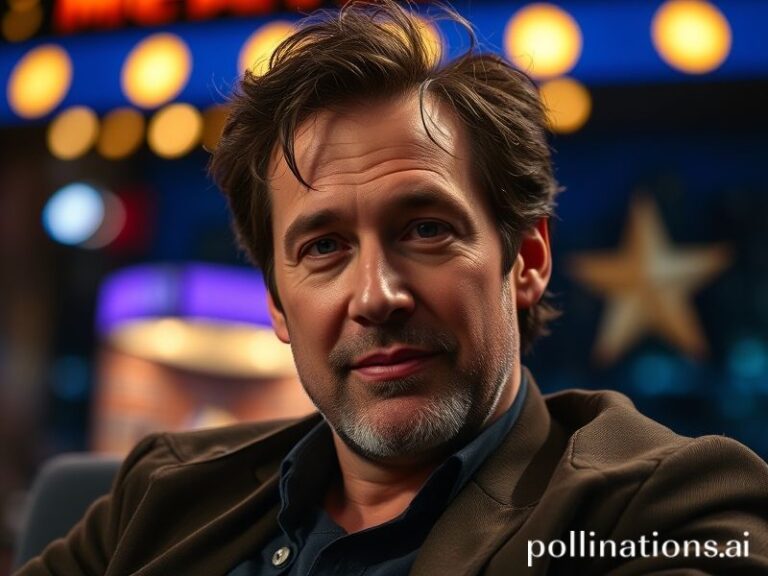Global Jury Duty: How Netflix’s ‘Accused’ Became the World’s Favorite Morality Play
The Netflix series “Accused” has now been binge-gorged in 190 countries, subtitled into 34 languages, and meme-ified by teenagers who think “habeas corpus” is a Harry Potter spell. From Buenos Aires to Baku, viewers watch the same 45-minute morality play: an ordinary schmuck stands in the dock, flashbacks reveal how quickly decency curdles, and a jury of suspiciously attractive citizens renders a verdict that feels suspiciously like our own doom scrolling. The global takeaway? We are all simultaneously judge, defendant, and unpaid content moderator.
International critics—those hardy souls who still pretend cultural nuance exists—have noticed that each territory tweaks the opening montage. In France, the defendant is a champagne socialist who mis-genders his au pair; in Japan, it’s a salaryman who forgot to recycle a PET bottle; in Nigeria, a charismatic pastor who ran a Ponzi scheme on WhatsApp. Same engine, different fuel: guilt sold by the liter like duty-free whiskey. Viewers everywhere recognize the scent; it smells faintly of their own hypocrisy and airport soap.
The show’s algorithmic triumph is also its geopolitical punchline. Netflix’s recommendation engine cross-pollinates “Accused” with local true-crime sensations—India’s “Delhi Crime,” Spain’s “Money Heist,” Korea’s “Squid Game.” The result is a planetary feedback loop where every society discovers its own venality, packaged with tasteful lighting and a moody cello score. We used to export democracy and Coca-Cola; now we export dramatized self-loathing in 4K HDR. Progress, surely.
Meanwhile, governments watch the numbers like hawks eyeing carrion. Chinese censors trimmed three minutes from the finale—too much bourgeois courtroom grandstanding—yet pirated versions ricochet around WeChat before the credits finish rolling. In Iran, state TV denounced the series as “imperialist jurisprudence” while quietly commissioning its own version where the accused is always a Western spy. Soft power has never been softer; it arrives by fiber-optic cable and leaves by VPN.
Human-rights lawyers from The Hague to Harare have started citing “Accused” in op-eds, which is both heartening and hilarious. Picture a war-crimes tribunal where the prosecutor pauses to ask, “Has anyone here seen episode six, the one with the drone strike and the emojis?” The show’s depiction of coerced confessions has become Exhibit A in debates about plea bargains in Brazil, where prisons already overflow like a Black Friday sale on despair. Art imitates life, life imitates bandwidth.
Even the subtitles are a battlefield. The Danish translation renders “beyond a reasonable doubt” as “uden rimelig tvivl,” but viewers insist the nuance is lost—apparently Nordic guilt requires at least three layers of existential dread. Meanwhile, Arabic subtitles bleep any reference to alcohol, turning the drunk-driving episode into a meditation on “excessive mango juice.” Somewhere, Kafka is updating his LinkedIn.
The broader significance, if one insists on such things, is that “Accused” has become the world’s first truly transnational courtroom. It convenes nightly on 1.2 billion screens, hears evidence from our collective id, and adjourns before the popcorn cools. The jury foreman is an algorithm trained on our watch history; the verdict is a push notification asking “Still watching?” We click yes, because admitting guilt is easier than changing the channel.
And so the planet spins, ever more efficiently mediated. Tomorrow’s scandal will be uploaded before today’s apology tour finishes buffering. Somewhere a teenager in Jakarta drafts a TikTok dance called “Presumption of Innocence,” while an oligarch in Moscow screen-shots the closing arguments for his tax-evasion PowerPoint. We are all, in the end, co-creators of this ongoing season finale. Just pray the writers don’t decide to kill us off for ratings.







